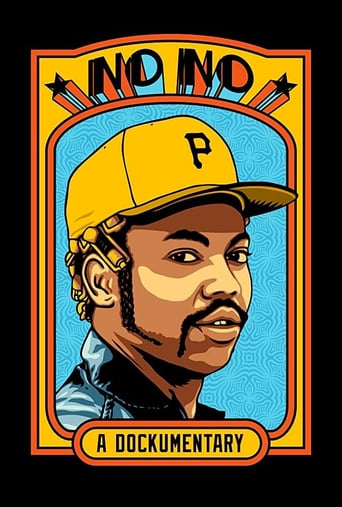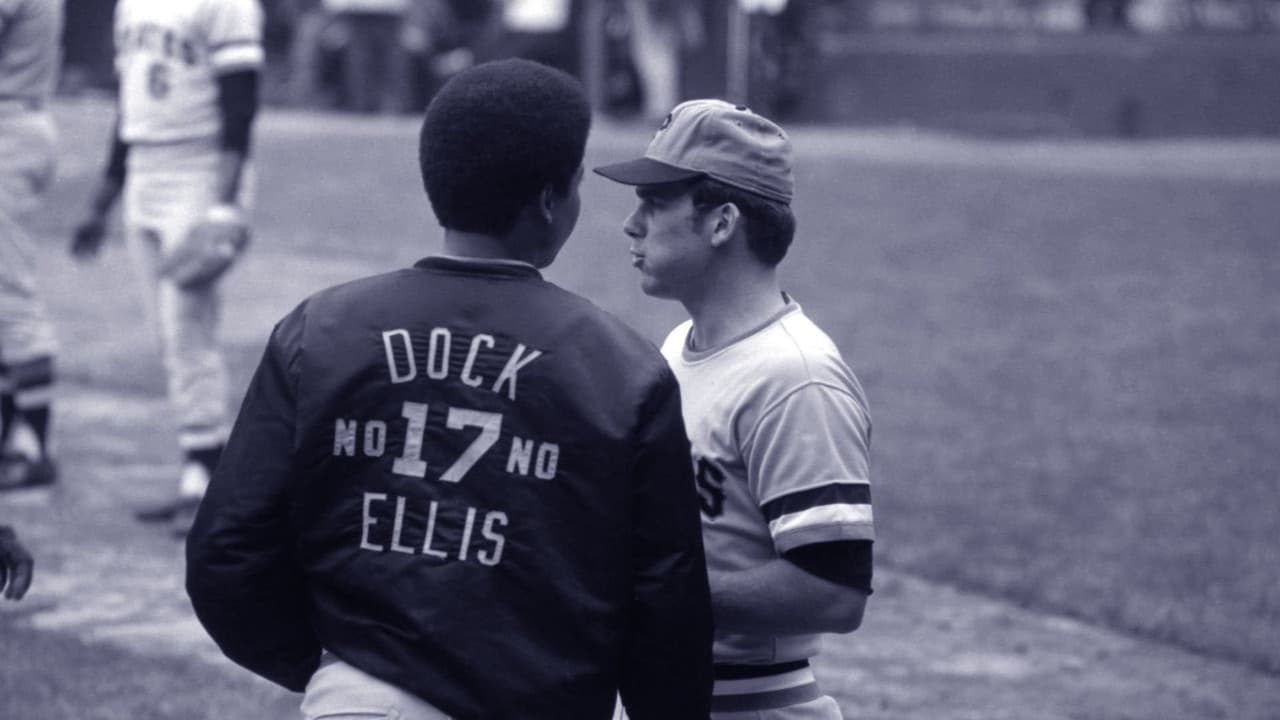Antonius Block
Dock Ellis was a brash, talented pitcher known most for pitching a no-hitter while on LSD, and for substance abuse problems throughout his career. This "dockumentary" tells his story, and with it's compelling with its interviews from childhood friends, teammates, and ex-wives, as well as his inspirational counseling work after he became clean.Ellis was a fascinating character. On the one hand he was a leader in speaking out against ridiculous policies, for example, fighting a suspension he received for wearing curlers in his hair with the Pirates, and then later the edict that players not drink in the hotel bar while with the Rangers. He was charismatic and outspoken to the point of being proclaimed by some as "baseball's Muhammed Ali", and got a touching letter from Jackie Robinson encouraging him despite a torrent of racist threats. On the other hand, he couldn't control his drug problems, starting with the amphetamines that were rampant in baseball at the time (some in the documentary estimate 90-95% of players), but soon spreading to almost everything else: cocaine, LSD, alcohol, heroin, etc. Ellis states that he was high for every game he ever pitched in the majors. Off the field, the incident his second wife describes when he abused her with guns for five hours is horrifying, and director Jeff Radice is at his best in including footage like this, but balancing it by showing the kind, loving, affable person Ellis was 99% of the time.Where the documentary is less successful is in including stock footage of players or cheesy animation while trying to show events from games where apparently no film exists. Inexplicably, there is also footage of the 1981 Kroc Foundation anti-drug film for kids called 'Dugout', which has little to no actual connection to Ellis and adds zero value. I would have also liked a little more content on the actual baseball, as Radice isn't all that detailed about big games in his career, apart from the no-hitter, and the time he hit the first 3 Reds players in a game on purpose. He'll take us to big events like the 1971 World Series but then not really show us all that much about Ellis's performance.Then again it's a human story, not a hardcore look at the man's career, and it was touching to see his relationship with Roberto Clemente, and how he spiraled after Clemente's tragic death. How Ellis turned himself around, gave back, and positively affected so many people's lives is also quite touching. Lastly, it's a fascinating look into baseball, race, and drugs in the 1970's. Solid film, and worth seeing.
Bruce Burns
I'm in my mid-40's now, but I am still too young to have ever seen Dock Ellis play. In fact I had never even heard of him until I saw this movie. The famous no-hitter that gives the film its title was played 9 months before I was born. And his career ended in 1979 when I was too young to sit still long enough to watch a baseball game. Which is not to say I *shouldn't* have heard of him. The names of many of his contemporaries such as Roberto Clemente, Pete Rose and Reggie Jackson are known to anyone with even a passing interest in baseball. And from what I saw in this film, Dock Ellis should be mentioned in the same breath.From the 1980's onward, Ellis was known for his admission that he was addicted to drugs and alcohol throughout his baseball career. In 1970, he pitched a no-hitter while flying on LSD--which inspired Robin Williams to do a bit about it more than 30 years later. But when he was actually playing, he was known as the angry black pitcher who wore hair curlers and earrings--which inspired Johnny Carson to do a bit about it at the time.But the film is not just about baseball and popular culture. "No No: A Dockumentary" succeeds in its goal of providing a complete portrait of this fascinating individual. It uses interviews of friends, family and even two of his ex-wives. And even though Ellis died during filming, director Jeff Radice was able to get a very thorough interview with Ellis, so you don't get the feeling that you're only learning about this guy from others' points of view. It starts with his teen years in Compton. Then it focuses on his 1968-1973 peak with the Pirates, his 1976 comeback with the Yankees, and the 1978-1979 end of his career with the Rangers. And then finally it focuses on the final 25 years of his life as the public face of drug addiction in sports and a drug counselor.The things I like best about the movie are the interviews, which feel like you're sitting on the porch with your family swapping stories about your crazy cousin. And I like that Adam "King Ad-Rock" Horowitz is able to replicate the psychedelic rock and funk sounds from the period, even though the filmmakers couldn't get the rights to the big hits of the day.The main problem I have with this film--and it's a minor quibble--is that of all the on-field stories about Dock, the only game they show using old TV footage is the no-hitter. All the rest are represented through still photographs or--in one case--a slide show of comic strip panels.Dock Ellis was possibly the greatest pitcher of the early 1970's. And his influence extended into the greater culture at large--from his fashion sense that was replicated by the gangsta rappers of the early 1990's (Ice Cube in particular), to his becoming a leading advocate of drug rehabilitation programs in the Just Say No 1980's. The fact that I had never heard of him until now is frankly a shame. He was a great ballplayer, and once he sobered up he became a greater human being. "No No: A Dockumentary" is a testament to this. 8 out of 10.
jacksbernstein
A well-done film featuring interviews with baseball legends, Hollywood director Ron Howard, vintage Pirates like Blass, Al Oliver, Bob Robertson and others, and interviews with Dock Ellis himself. The movie traces Dock's journey from a gifted pitcher who threw a no-hitter on LSD, faced Vida Blue in the 1971 All Star Game, and eventually faced his addictions and became a counselor to other addicts. If you liked this film, you'll also love "Baseball's Last Hero: 21 Clemente Stories", another new film showing the spiritual journey of the great Roberto Clemente who was Dock's teammate and mentor. " Baseball's Last Hero" is the companion film to this film and is also on IMDb and Amazon. Both films go beyond baseball to say something meaningful.
David Ferguson
Greetings again from the darkness. Caught this one at the Dallas International Film Festival, and the most impressive part of director Jeff Radice's approach is just how much he attempts to tackle. Most baseball fans immediately associate the name Dock Ellis with his much publicized 1970 no-hitter thrown while under the influence of LSD. Radice doesn't focus on the baseball side of this story, but rather much more of the man and the times.One must be of a certain age to have watched Dock Ellis pitch (he retired in 1979), and the era must be considered when understanding his often outspoken and arrogant behavior. Jackie Robinson had long ago broken the color barrier in baseball, but it wasn't until the early 1970's when things really started to change. 1971 saw the first all black and brown lineup from the Pirates (with Dock Ellis on the mound). The blacks and Latins interviewed here recall the moment they noticed.In addition to his baseball and related antics, we get some history on his marriages, style, drug abuse and struggle to remain healthy near the end of his career. Radice scores with the numerous interviews of former teammates, as well as friends and family. Steve Blass and Bruce Kison provide a contrast to the words of Dave Cash, Mudcat Grant and Al Oliver, but the most insight comes from Ellis' friends and family. This is where we see the hope and disappointment that Dock produced.We also see the later years as Dock became a drug counselor and educated many on the mistakes he had made. Radice uses a 1981 movie called "Dugout" features former major league pitcher Bo Belinsky talking to little-leaguers about the importance of staying on the right track ... the parallels to the career of Dock Ellis are obvious.Some terrific game footage is used, but one of the most interesting moments occurs when Brad Corbet, Jr explains how his father (former owner of Texas Rangers) had interaction with Dock Ellis the player, and later with Dock Ellis the addiction counselor. There is also much made about "everyone" in baseball being on "greenies" (amphetemines) during the era ... an interesting contrast to the steroid era. The main thing we learn is that there was much more to Dock Ellis than LSD and curlers in his hair.



 AD
AD


